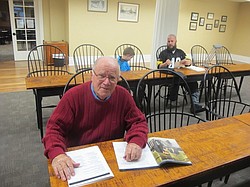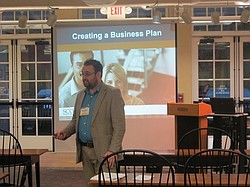Area residents learn how to write a business plan
Neighbors | Tim Cleveland.Charles Whitman of SCORE attended the business plan class at the Poland library to lend advice and answer questions that the attendees had.
Neighbors | Tim Cleveland.Main library business librarian Stuart Gibbs led the class teaching how to write a business plan, which was hosted by the Poland library.
By TIM CLEVELAND
The Poland library hosted a class on creating a business plan on Oct. 20, with business librarian Stuart Gibbs speaking for 90 minutes about how area residents can write their own business plans.
“Tonight we’re talking about creating a business plan for area businesses,” he said. “We’re going to talk about what’s in a business plan, the executive summary, we’re going to talk about business descriptions, marketing, demographics, financial statements. We’re also going to talk about the supporting documents, for example how they look up resources using the library to match all of those particular needs. We’re going to look at some specific examples for each of those areas, and then we’re going to actually apply them and have them write something up for their own business.”
Assisting Gibbs was Charles Whitman, past president of SCORE (Counselors to America’s Small Businesses), a group of experienced business owners who give advise to small business owners. Whitman’s role was to work with the attendees and answer any questions they had.
Whitman owned his own business for 22 years and spent 19 years as director of the career services department at Youngstown State University.
The business plan class was part of a series of workshops done four times per year. The others are business startup, know your customers, locate your customers and investment 24/7.
“I’ve put my own unique spin on it so that people can actually get more involved to do some group activities so they can hopefully learn from each other and not just from me doing a presentation,” Gibbs said.
Gibbs was asked which particular areas of business plans people need the most help with.
“For example, profit/loss statements,” he said. “What do you consider profit in a business, what do you consider loss in a business. When you’re marketing your business, what is a good way to market? Is it better to talk to people face to face, newspaper, where are you going to get the best bang for your buck? What does the local market demographic tell you?
“There’s so many different choices. Each one is going to be different and unique to that particular individual.”
Gibbs said people being able to write their own business plan is a big advantage over a person who has to hire someone to write it for them.
“It makes it personal and they know what they’re doing,” he said. “They know what they’re talking about in the end. If I’m marketing a donut shop, do I locate it in a rural community with very few people, or do I locate it in a downtown city where we have a huge daytime population? Or, what street do I locate it on? All of those decisions, if they’re doing the research, they’re going to know why they made that particular decision and why chose that specific location.”
 43
43


